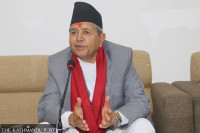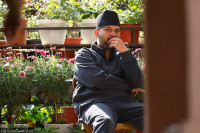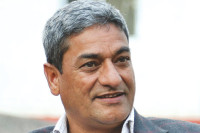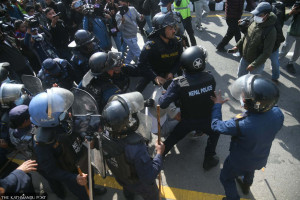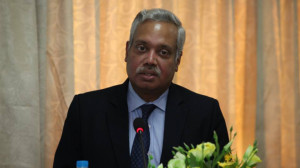National
Gurkha veterans memo UK PM Sunak seeking redressal of their pension issues
The next meeting of Nepal and British governments with representatives of the agitating ex-Gurkhas is scheduled for April 19.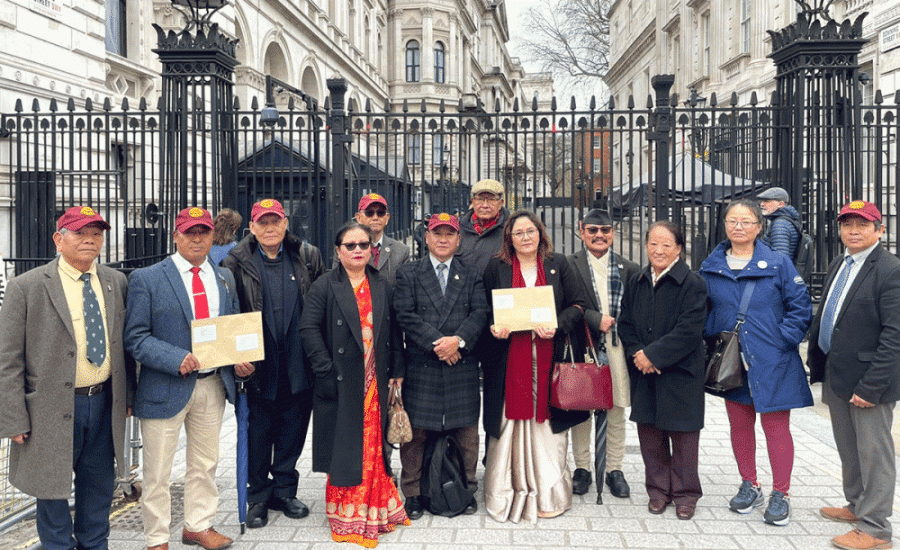
Post Report
The agitating British Gurkha ex-servicemen have submitted a memorandum to the British Prime Minister Rishi Sunak requesting not to exclude their pension issues during the upcoming talks between Nepal and the British governments where representatives of the agitating ex-Gurkhas will also participate.
As per the technical report prepared by the three sides in 2018, the governments of Nepal, the United Kingdom and representatives of the ex-Gurkhas will sit for talks in order to settle their long-standing demand of the veterans for pension on par with their British counterparts.
Under the banner of the British Gurkha Satyagraha Joint Committee, the ex-Gurkhas have asked the British authorities not to sideline the issue of equal pension.
All ex-British Gurkhas who joined the British Army between January 1 and September 30, 1993, have been campaigning demanding justice and equality for the past 30 years, based on the British and human rights laws. On March 22, 2018, the then British Minister Mark Lancaster had met the Gurkha Technical Team to accept the technical report detailing the Gurkha issues. “I will respond within a few weeks,” Lancaster said at the time.
“Unfortunately, he spent three years lobbying the Nepal PM and his ministers, who rejected his offer of a package on behalf of the grieving Gurkhas. This unfortunate act forced Gurkha veterans to stage another hunger strike in August 2021. On August 21, 2021, Leo Docherty, then Parliamentary Under-Secretary of State for Defence People and Veterans and the Nepali Ambassador at the time, Lokdarsan Regmi arrived at pen (an area designated for staging strike), and presented the agitators a signed letter promising that the two governments would hold talks to investigate their grievances based on the technical report of 2018,” says the ex-Gurkhas’ letter to Sunak, describing the sequence of events.
Later, ambassador Regmi met with Ben Wallace, Secretary of State for Defence, on September 8, 2021 along with ex- Gurkha veterans where Wallace said, “I want the Gurkhas to include every issue you have, so that there will be no protests in the future.”
In between, the Nepali government recalled ambassador Regmi and sent Gyan Chandra Acharya as its new envoy to London, giving him full authority to represent the government of Nepal at the tripartite talks.
After Acharya went to London, on November 3, 2022, the next round of tripartite talks were held in London, where according to the Krishna Bahadur Rai, chief coordinator of the British Gurkha Satyagraha Joint Committee, it was decided that at least one meeting per month would be held to resolve every outstanding Gurkha issue.
However, the Minister for Defence went to Nepal and met the Nepali prime minister and other ministers in early February 2023. “Upon returning to the UK, through the House of Parliament, a letter to Leo Docherty and via other sources, the minister has categorically stated that only welfare matters are on the agenda, not the pension issues,” the memorandum submitted to Sunak stated.
“Now the next meeting is scheduled for April 19. If they impose their agenda of only providing welfare benefits to us, not the equal pension that we are fighting for, we will walk out of the talks and resume another round of hunger strike from May 1,” Rai told the Post.
“The British government is trying to dupe us again, but we are not going to abandon our demands,” said Rai. The Nepali ambassador Acharya too, has been sounded on the matter, he added.
On his part, Acharya told the ex-Gurkha delegation that the embassy has already written to the British government seeking its agenda for the next round of talks, but they have yet to get any response from the British side.
Acharya urged the agitating delegation to remain calm until the next round of talks as holding a hunger strike isn’t an alternative to their problem.
The British government—which had earlier dismissed ex-Gurkhas’ claim seeking equal pension and pay for those who had retired or had been made redundant by the British Army before 2006—has been saying that it will now only reconsider the demands on welfare and medical benefits.
But the tripartite talks were delayed due to frequent political changes in the United Kingdom. The 1947 tripartite agreement between Nepal, British and Indian governments had clearly outlined equal pay, pension and perks for Nepali youths serving the Indian and British armies.
The agreement had also paved the way for the distribution between India and Britain of existing Gurkha brigades serving in British India. Thus, the 2nd, 6th, 7th and 10th units of Gurkha Rifles became part of the British Army, while the remaining brigades were retained by an independent India.
The tripartite pact assures that all perks, remuneration, benefits and pension schemes for Nepalis serving in the British and Indian armies will be equal to those of British and Indian nationals. However, Gurkha veterans have long accused Britain of pursuing discriminatory policies on remuneration.
On March 20, 2017, the British government had agreed to form a panel to study the demands of retired Gurkha army personnel, including on pension. The panel submitted its report to the governments of Nepal and Britain on March 22, 2018.
The report suggested that both governments form a committee for dialogue between Nepal and the British governments to address the demands of the British Gurkha veterans for equal pension.
Apart from equal pension rights, the Gurkha veterans have also been demanding equal pay and perks, free healthcare and equal compensations, residency for family members of Gurkha soldiers and equal pension for the widows of Gurkha soldiers who died during service.
Although the Gurkhas who retired after 2007 are getting pension and other perks on par with their British counterparts, the problem is with regard to the more than 8,000 Gurkhas who retired before 2007. The disparity and difference is more than 300 percent, according to Gurkha Satyagraha United Struggle Committee, which is leading the campaign.
As matters stand, the British side has time and again communicated to the Nepali authorities that giving equal perks and pension to former Gurkha soldiers would add a huge financial burden on the British government. According to the Gurkha Satyagraha United Struggle Committee, more than 25,000 pensioners who retired before July 1, 2007 were deprived of equal pension.
But that number has since come down to around 8,000 as others have died. In March 2019, the British government had announced an increase in pension by up to 34 percent for the Brigade of Gurkha servicemen who had joined before 2007. However, that decision was rejected by the Gurkha veterans, who called it a “piecemeal approach” that was not on par with the British nationals.
“This deliberate negligence by the British delegation is forcing the ex- Gurkhas to issue an ultimatum, for another more vigorous campaign which we would like to avoid,” said the ex-Gurkhas’ letter to the British prime minister.




 18.12°C Kathmandu
18.12°C Kathmandu
